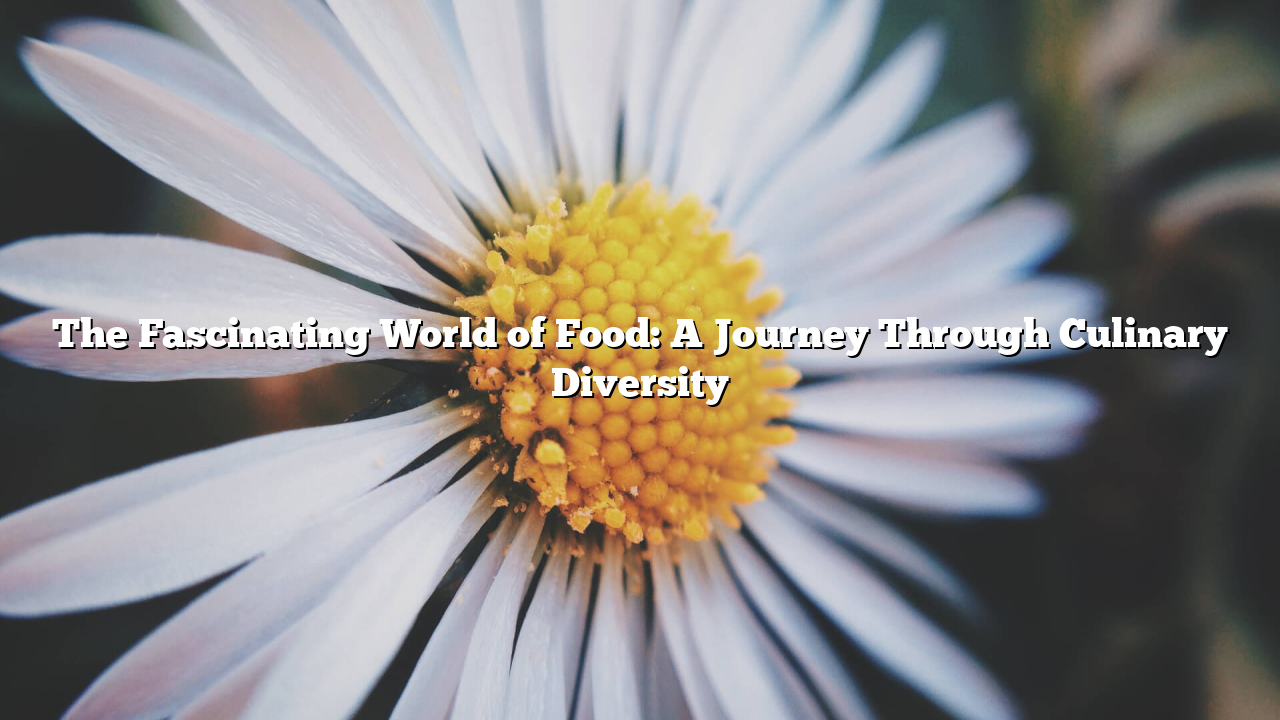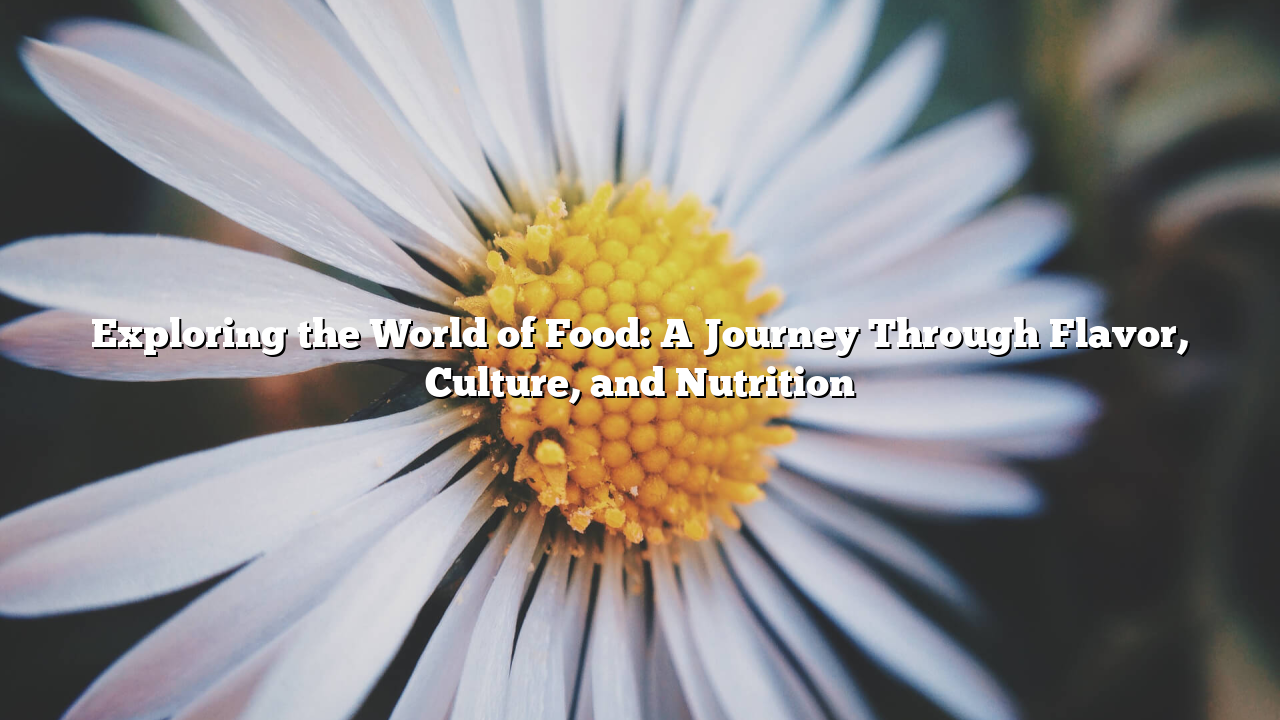Food is more than just sustenance; it’s an essential part of human culture, history, and
identity. From the comforting warmth of a home-cooked meal to the exciting flavors of
international cuisine, food has a unique ability to bring people together, evoke memories,
and shape our well-being. This article delves into the multifaceted role food plays in our
lives, exploring its nutritional value, cultural significance, and how it continues to evolve in
our modern world.
The Importance of Nutrition
At its core, food is essential for survival. Our bodies rely on nutrients to function properly,
and the food we consume provides the fuel needed for energy, growth, and overall health.
Nutrients in food are generally divided into six categories: carbohydrates, proteins, fats,
vitamins, minerals, and water. Each of these plays a vital role in maintaining the body’s
functions.
Carbohydrates, found in foods like bread, pasta, and rice, are the primary source of energy
for the body. They are broken down into glucose, which is used by the body’s cells to
perform various functions. Proteins, present in meats, dairy, legumes, and nuts, are essential
for building and repairing tissues and producing enzymes and hormones. Fats, found in oils,
nuts, and fatty fish, provide long-term energy storage and support cell structure and function.
Vitamins and minerals are crucial for immune health, bone strength, and various biochemical
processes. Vitamin C, found in citrus fruits, is necessary for skin health, while calcium, found
in dairy and leafy greens, is important for strong bones. Water, though often overlooked, is
perhaps the most critical nutrient as it helps regulate body temperature, aids digestion, and
facilitates the transportation of nutrients within the body.
slot deposit 1000 qris and Culture: A Universal Language
Food serves as a cultural expression, with every country and region boasting its own unique
culinary traditions. For instance, Italian cuisine is known for its simplicity and reliance on
fresh, quality ingredients, with iconic dishes like pasta, pizza, and risotto. In contrast, Indian
cuisine is characterized by its bold use of spices and complex flavors, offering dishes like
curry, biryani, and samosas.
Cultural traditions surrounding food also play a significant role in shaping how meals are
prepared and consumed. In many parts of the world, food is an integral part of social
gatherings, celebrations, and rituals. In Japan, for example, the preparation and
consumption of sushi is not just about taste, but about artistry and precision. Similarly, in
Mexico, the process of making tortillas by hand is a time-honored tradition that holds deep
cultural significance.
Moreover, food often acts as a bridge between generations. Family recipes passed down
through the ages provide a link to one’s heritage and evoke a sense of belonging. For many,
a meal is a way to connect with loved ones and celebrate shared histories, traditions, and
values.
The Impact of Globalization on Food
In recent decades, globalization has significantly impacted the way we access and enjoy
food. The rise of international trade and travel has made it easier to experience different
cuisines from around the world. Today, a person in New York City can easily enjoy sushi
from Japan, pasta from Italy, or tacos from Mexico. This accessibility has led to a global
fusion of cuisines, where ingredients and techniques from one culture are combined with
those of another.
For instance, dishes like “California sushi rolls” or “taco pizzas” are examples of how
globalized food culture has led to the blending of different culinary traditions. While this
fusion often results in exciting new flavors, it has also sparked debates about authenticity
and cultural appropriation in food. As people from various cultures adopt and adapt different
foods, it is important to consider the origins and cultural significance of these dishes.
At the same time, globalization has brought with it challenges such as food insecurity and
the loss of traditional food practices. In many regions, the increased availability of processed
and fast foods has led to rising rates of obesity and diet-related diseases. This shift away
from locally sourced and home-cooked meals has raised concerns about the long-term
health implications for communities around the world.
Food and Health: The Growing Trend of Conscious Eating
In recent years, there has been a noticeable shift towards more mindful eating habits. As
people become more aware of the impact of their food choices on both their health and the
environment, there is an increasing interest in organic, locally sourced, and sustainable
foods.
One of the key trends in this movement is the rise of plant-based diets. More individuals are
choosing to reduce or eliminate animal products from their diets due to concerns about
animal welfare, environmental sustainability, and health benefits. Studies have shown that
plant-based diets, which focus on vegetables, fruits, legumes, and whole grains, can lower
the risk of chronic diseases such as heart disease, diabetes, and cancer.
Additionally, there is growing interest in “clean eating,” which emphasizes whole,
unprocessed foods over refined and artificial ingredients. This trend has also led to the rise
of food transparency, with consumers increasingly demanding to know where their food
comes from and how it is produced. Companies are responding by offering more organic,
free-range, and ethically sourced options, while also reducing the use of preservatives,
additives, and artificial flavors.
The Future of Food
As we look to the future, the way we produce and consume food is expected to undergo
significant changes. Technological innovations are playing an increasing role in shaping the
food industry. Lab-grown meats, for example, are being developed as a sustainable
alternative to traditional animal farming, which has a large environmental footprint. In
addition, vertical farming and hydroponics are being explored as ways to grow food in urban
areas, reducing the need for large-scale agricultural land and minimizing food transportation.
Another exciting development is the rise of food delivery services and meal kits, which allow
individuals to enjoy restaurant-quality meals in the comfort of their homes. As people
continue to seek convenience, these services are likely to become even more prevalent,
reshaping the way we think about home cooking.
Conclusion
Food is much more than just a source of nourishment. It is a reflection of our cultures,
identities, and values, and it has the power to unite us across borders and generations.
Whether we are savoring a simple home-cooked dish or exploring the flavors of the world,
food continues to shape our lives in profound ways. By understanding the nutritional,
cultural, and environmental aspects of food, we can make informed choices that benefit not
only our health but also the world around us.
Exploring the World of Food: A Journey Through Flavor, Culture, and Health











Leave a Reply